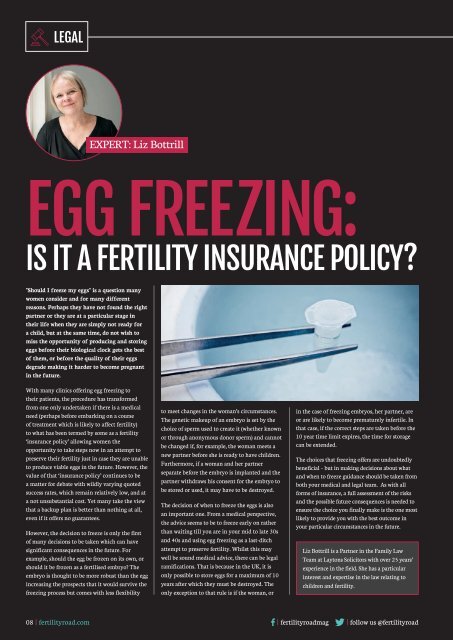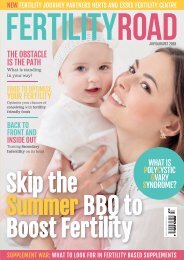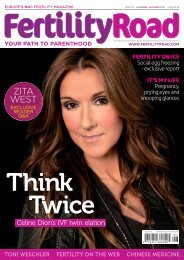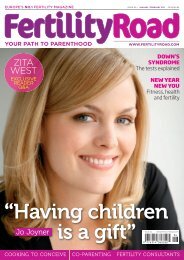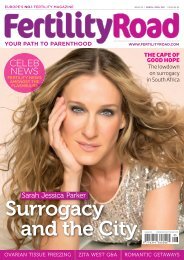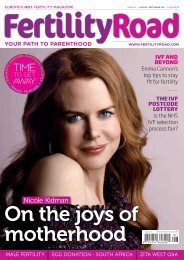Fertility Road Magazine 46 - September/October 2018
The latest issue of Fertility Road Magzine brings you our latest Fertility Journeys update, a closer look at stress and infertility, natural approaches to endometriosis and a how your weight can affect your chances of getting pregnant plus lots, lots more.
The latest issue of Fertility Road Magzine brings you our latest Fertility Journeys update, a closer look at stress and infertility, natural approaches to endometriosis and a how your weight can affect your chances of getting pregnant plus lots, lots more.
You also want an ePaper? Increase the reach of your titles
YUMPU automatically turns print PDFs into web optimized ePapers that Google loves.
LEGAL<br />
EXPERT: Liz Bottrill<br />
EGG FREEZING:<br />
IS IT A FERTILITY INSURANCE POLICY?<br />
"Should I freeze my eggs" is a question many<br />
women consider and for many different<br />
reasons. Perhaps they have not found the right<br />
partner or they are at a particular stage in<br />
their life when they are simply not ready for<br />
a child, but at the same time, do not wish to<br />
miss the opportunity of producing and storing<br />
eggs before their biological clock gets the best<br />
of them, or before the quality of their eggs<br />
degrade making it harder to become pregnant<br />
in the future.<br />
With many clinics offering egg freezing to<br />
their patients, the procedure has transformed<br />
from one only undertaken if there is a medical<br />
need (perhaps before embarking on a course<br />
of treatment which is likely to affect fertility)<br />
to what has been termed by some as a fertility<br />
‘insurance policy’ allowing women the<br />
opportunity to take steps now in an attempt to<br />
preserve their fertility just in case they are unable<br />
to produce viable eggs in the future. However, the<br />
value of that ‘insurance policy’ continues to be<br />
a matter for debate with wildly varying quoted<br />
success rates, which remain relatively low, and at<br />
a not unsubstantial cost. Yet many take the view<br />
that a backup plan is better than nothing at all,<br />
even if it offers no guarantees.<br />
However, the decision to freeze is only the first<br />
of many decisions to be taken which can have<br />
significant consequences in the future. For<br />
example, should the egg be frozen on its own, or<br />
should it be frozen as a fertilised embryo? The<br />
embryo is thought to be more robust than the egg<br />
increasing the prospects that it would survive the<br />
freezing process but comes with less flexibility<br />
to meet changes in the woman’s circumstances.<br />
The genetic makeup of an embryo is set by the<br />
choice of sperm used to create it (whether known<br />
or through anonymous donor sperm) and cannot<br />
be changed if, for example, the woman meets a<br />
new partner before she is ready to have children.<br />
Furthermore, if a woman and her partner<br />
separate before the embryo is implanted and the<br />
partner withdraws his consent for the embryo to<br />
be stored or used, it may have to be destroyed.<br />
The decision of when to freeze the eggs is also<br />
an important one. From a medical perspective,<br />
the advice seems to be to freeze early on rather<br />
than waiting till you are in your mid to late 30s<br />
and 40s and using egg freezing as a last-ditch<br />
attempt to preserve fertility. Whilst this may<br />
well be sound medical advice, there can be legal<br />
ramifications. That is because in the UK, it is<br />
only possible to store eggs for a maximum of 10<br />
years after which they must be destroyed. The<br />
only exception to that rule is if the woman, or<br />
in the case of freezing embryos, her partner, are<br />
or are likely to become prematurely infertile. In<br />
that case, if the correct steps are taken before the<br />
10 year time limit expires, the time for storage<br />
can be extended.<br />
The choices that freezing offers are undoubtedly<br />
beneficial – but in making decisions about what<br />
and when to freeze guidance should be taken from<br />
both your medical and legal team. As with all<br />
forms of insurance, a full assessment of the risks<br />
and the possible future consequences is needed to<br />
ensure the choice you finally make is the one most<br />
likely to provide you with the best outcome in<br />
your particular circumstances in the future.<br />
Liz Bottrill is a Partner in the Family Law<br />
Team at Laytons Solicitors with over 25 years’<br />
experience in the field. She has a particular<br />
interest and expertise in the law relating to<br />
children and fertility.<br />
08 | fertilityroad.com<br />
| fertilityroadmag | follow us @fertilityroad


